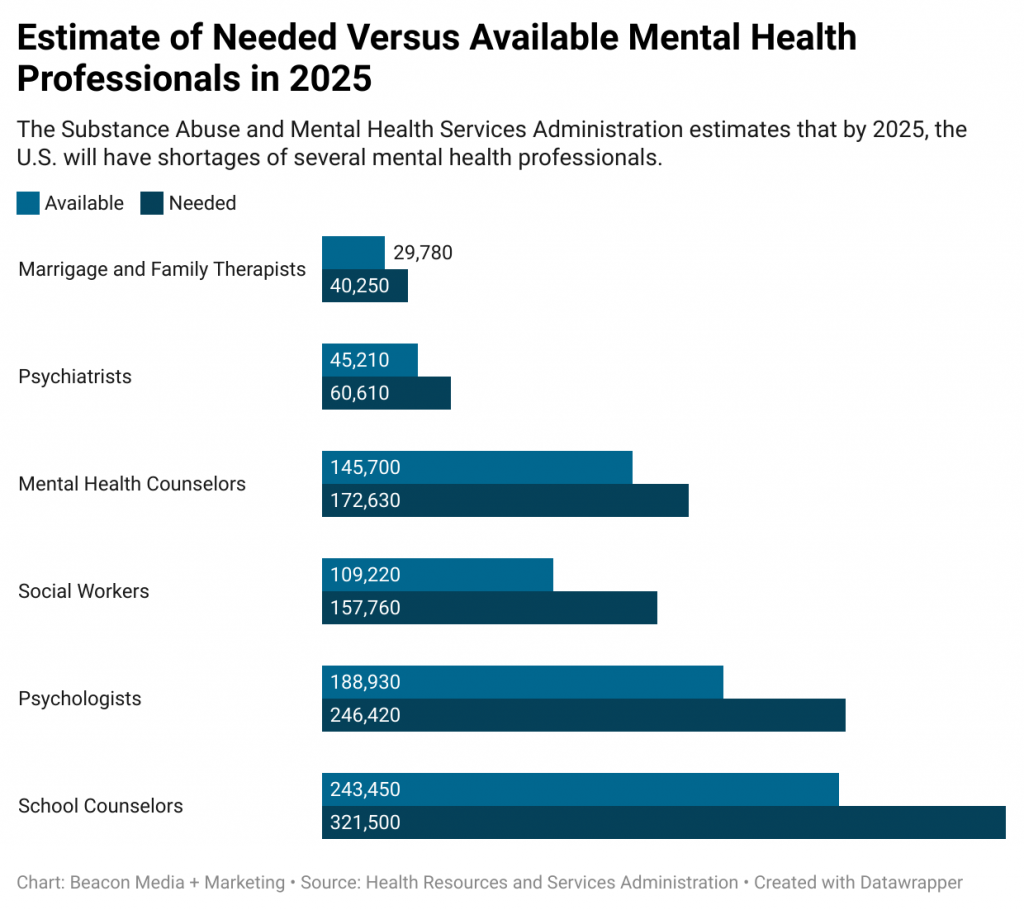Mental health is becoming more of a priority for people, which means more people than ever are reaching out for help. The movement for better mental health is great, but now there is a significant disproportion of clients in need and mental health professionals.
With the unexpected boom, there aren’t enough providers to care for those in need. Several variables have lead to a shortage of mental health professionals in the United States. Here is why there is a shortage and what we can do to fix it.
Do you want to connect with more clients?Learn how Ravel Mental Health can help.
The Growing Demand for Mental Health Services
Many people seek treatment for depression, anxiety, substance abuse, and more. Having guidance on how to handle or get through these issues is essential. People turn to therapists in hopes that they can feel relieved, break free from addiction, and improve their overall quality of life
Many people are turning to online mental health services because of the accessibility and ease of being online. However, having in-person interactions are still essential. People are reaching out to talk in a safe environment that makes them feel supported in their journey.
With so many people reaching out, there’s now a considerable shortage of mental health professionals that can help.
Factors Contributing to the Shortage of Mental Health Professionals
Not being able to meet the need for mental health services in the United States is a serious issue. There has been a rapid increase in mental illness, including an uptick is children’s mental health emergencies, suicide rates, and overdoses. And many people are struggling to get the care they need to prevent these issues.
Several factors feed into why there is a shortage of mental health professionals in the United States.
The Mental Health Workforce Is Shrinking
A factor taking a toll on the deficit is the lack of people entering the field. Some people aren’t going into the field due to the level of education needed. To be a mental health provider, most positions need at least a master’s degree or even a doctorate’s degree. And many providers need to obtain additional education and training to become licensed or earn certain certifications.
Being a mental health provider can also be emotionally draining. While many people who are drawn to a career in mental health have a deep desire to help others, it can be a stressful and demanding job. And many younger generations don’t want to commit to that.
In addition to there being a decrease in the number of people entering the field, a large portion is retiring out of it. So, with more people leaving, it lends the field to face shortages.
Demand is Higher Than the Supply
According to an American Psychological Association poll, nearly 30% of 1,800 psychologists have seen an increase in patients compared to before the pandemic. For patients with anxiety disorders, 74% of those psychologists saw an increase. Then 60% said they were seeing more patients with depressive disorders.
With the giant uptick in mental health issues, there aren’t enough providers to care for those in need. The Census Bureau reported that 30% of American adults have consistent symptoms of anxiety or depression. And an estimated 122 million Americans, or 37% of the population, live in areas with mental health professional shortages.
A study of almost 190 million emergency department visits found that visit rates for mental health conditions, suicide attempts, drug overdoses, and child abuse and neglect were higher from mid-March to October 2020 compared to the same period in 2019.
With numbers rising increasingly, it becomes harder for the limited amount of mental health care professionals to keep up with the great demand. The Substance Abuse and Mental Health Services Administration estimates that by 2025, the U.S. will have shortages of:

There Is a Lack of Mental Health Specialists
Another factor contributing to the shortage is what specialties mental health professionals have chosen. There is a large disproportion between different areas of specialties. The employment numbers include:
- Substance abuse, behavioral disorder, and mental health counselors- 293.6k
- Mental health and substance abuse social workers- 116.8k
- Marriage and family therapists- 60.9k
- Psychiatric aids- 51.5k
- Psychiatrists- 25.5k
- Clinical psychologists- 11.3k
The disproportion between specialties acts as a barrier to getting the specific help people need. Although counselors having a more considerable proportion of the employment rate is beneficial for day-to-day therapy, the other specialties can suffer because of that.
Want to connect to clients in your specialty? Sign up for Ravel Mental Health.
Rural Locations Are the Most Underserved
One of the biggest reasons for a shortage is the disproportion of where mental health professionals are located. Many providers are in urban areas, leading to undertreated rural areas. However, there aren’t enough mental health professionals to meet the demand, even in highly populated areas.
A study evaluated the shortage of professionals at the county level and found that over three-quarters (77%) of U.S. counties had a severe lack of prescribers or nonprescribers, with over half of their needs unmet. Almost one in five counties in the nation had at least some unmet need for nonprescribers. At the same time, nearly 96% of every county had at least some unmet need for prescribers.
Over 115 million people in the United States live in designated Health Professional Shortage Areas.
- The United States has an average of 30.0 psychologists per 100,000 people and 15.6 psychiatrists per 100,000 people.
- Metropolitan counties have an average of 33.2 psychologists per 100,000 people and 17.5 psychiatrists per 100,000 people.
- Non-metropolitan counties have an average of 13.7 psychologists per 100,000 people and 5.8 psychiatrists per 100,000 people.
- Rural counties (areas without any cities larger than 10,000 people) have an average of 9.1 psychologists per 100,000 people and 3.4 psychiatrists per 100,000 people.
Rural areas typically lack the funding or infrastructure necessary to provide care. Data shows the need versus the availability of care to understand the disproportion in urban and rural areas. Wyoming and Utah have the most significant proportion of the population living in mental health shortage areas at 96.4% and 83.3%.
How Can We Move Towards Fixing the Problem?
Moving towards fixing the problems will require many steps. Part of the solution may include providing financial support to those in the health care profession, there are some other issues to tackle. Teletherapy has helped bring services to people who are housebound or who live far from a mental health providers. However, issues with digital literacy and lack of internet connection can still make it different for rural communities to access mental health care.
Some states may require a small number of providers to fill shortages, such as Delaware, which requires only 15 more mental health providers to solve its shortage. On the other hand, some states need many professionals to resolve the issue, such as Texas, which requires an additional 638. Focusing on the areas with the highest need is one way to help mitigate the issue.
Help More People With Ravel Mental Health
A shortage in mental health professionals can place a lot of strain on current providers. You’re not alone if you feel there are more people seeking your services than you can help. And therapists struggle to juggle the constant calls and administrative tasks that come with running a private practice with time spent in sessions.
Ravel Mental Health can help you streamline your processes and connect with more clients who are a good fit for your practice. Clients can even look at your availability using our online platform and schedule an appointment themselves. You’ll be able to accept their booking with one click, so it’s easy for everyone.
With all the time you’ll save not handling the small details of running your practice, you can focus your time on energy on efficiently growing your client base and helping more people.
We can move towards closing the gap together. Sign up for Ravel Mental Health today.
